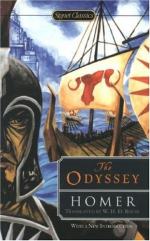And left all helpless in a desert isle;
There he, the sweetest of the sacred train,
Sung dying to the rocks, but sung in vain.
Then virtue was no more; her guard away,
She fell, to lust a voluntary prey.
Even to the temple stalk’d the adulterous spouse,
With impious thanks, and mockery of the vows,
With images, with garments, and with gold;
And odorous fumes from loaded altars roll’d.
“Meantime from flaming Troy we cut the way
With Menelaus, through the curling sea.
But when to Sunium’s sacred point we came,
Crown’d with the temple of the Athenian dame;
Atride’s pilot, Phrontes, there expired
(Phrontes, of all the songs of men admired
To steer the bounding bark with steady toil,
When the storm thickens, and the billows boil);
While yet he exercised the steerman’s art,
Apollo touch’d him with his gentle dart;
Even with the rudder in his hand, he fell.
To pay whole honours to the shades of hell,
We check’d our haste, by pious office bound,
And laid our old companion in the ground.
And now the rites discharged, our course we keep
Far on the gloomy bosom of the deep:
Soon as Malae’s misty tops arise,
Sudden the Thunderer blackens all the skies,
And the winds whistle, and the surges roll
Mountains on mountains, and obscure the pole.
The tempest scatters, and divides our fleet;
Part, the storm urges on the coast of Crete,
Where winding round the rich Cydonian plain,
The streams of Jardan issue to the main.
There stands a rock, high, eminent and steep,
Whose shaggy brow o’erhangs the shady deep,
And views Gortyna on the western side;
On this rough Auster drove the impetuous tide:
With broken force the billows roll’d away,
And heaved the fleet into the neighb’ring bay.
Thus saved from death, the gain’d the Phaestan shores,
With shatter’d vessels and disabled oars;
But five tall barks the winds and water toss’d,
Far from their fellows, on the Aegyptian coast.
There wander’d Menelaus through foreign shores
Amassing gold, and gathering naval stores;
While cursed Aegysthus the detested deed
By fraud fulfilled, and his great brother bled.
Seven years, the traitor rich Mycenae sway’d,
And his stern rule the groaning land obey’d;
The eighth, from Athens to his realm restored,
Orestes brandish’d the avenging sword,
Slew the dire pair, and gave to funeral flame
The vile assassin and adulterous dame.
That day, ere yet the bloody triumphs cease,
Return’d Atrides to the coast of Greece,
And safe to Argos port his navy brought,
With gifts of price and ponderous treasure fraught.
Hence warn’d, my son, beware! nor idly stand
Too long a stranger to thy native land;
Lest heedless absence wear thy wealth away,
While lawless feasters in thy palace away;
Perhaps may seize thy realm, and share the spoil;
And though return, with disappointed toil,
There he, the sweetest of the sacred train,
Sung dying to the rocks, but sung in vain.
Then virtue was no more; her guard away,
She fell, to lust a voluntary prey.
Even to the temple stalk’d the adulterous spouse,
With impious thanks, and mockery of the vows,
With images, with garments, and with gold;
And odorous fumes from loaded altars roll’d.
“Meantime from flaming Troy we cut the way
With Menelaus, through the curling sea.
But when to Sunium’s sacred point we came,
Crown’d with the temple of the Athenian dame;
Atride’s pilot, Phrontes, there expired
(Phrontes, of all the songs of men admired
To steer the bounding bark with steady toil,
When the storm thickens, and the billows boil);
While yet he exercised the steerman’s art,
Apollo touch’d him with his gentle dart;
Even with the rudder in his hand, he fell.
To pay whole honours to the shades of hell,
We check’d our haste, by pious office bound,
And laid our old companion in the ground.
And now the rites discharged, our course we keep
Far on the gloomy bosom of the deep:
Soon as Malae’s misty tops arise,
Sudden the Thunderer blackens all the skies,
And the winds whistle, and the surges roll
Mountains on mountains, and obscure the pole.
The tempest scatters, and divides our fleet;
Part, the storm urges on the coast of Crete,
Where winding round the rich Cydonian plain,
The streams of Jardan issue to the main.
There stands a rock, high, eminent and steep,
Whose shaggy brow o’erhangs the shady deep,
And views Gortyna on the western side;
On this rough Auster drove the impetuous tide:
With broken force the billows roll’d away,
And heaved the fleet into the neighb’ring bay.
Thus saved from death, the gain’d the Phaestan shores,
With shatter’d vessels and disabled oars;
But five tall barks the winds and water toss’d,
Far from their fellows, on the Aegyptian coast.
There wander’d Menelaus through foreign shores
Amassing gold, and gathering naval stores;
While cursed Aegysthus the detested deed
By fraud fulfilled, and his great brother bled.
Seven years, the traitor rich Mycenae sway’d,
And his stern rule the groaning land obey’d;
The eighth, from Athens to his realm restored,
Orestes brandish’d the avenging sword,
Slew the dire pair, and gave to funeral flame
The vile assassin and adulterous dame.
That day, ere yet the bloody triumphs cease,
Return’d Atrides to the coast of Greece,
And safe to Argos port his navy brought,
With gifts of price and ponderous treasure fraught.
Hence warn’d, my son, beware! nor idly stand
Too long a stranger to thy native land;
Lest heedless absence wear thy wealth away,
While lawless feasters in thy palace away;
Perhaps may seize thy realm, and share the spoil;
And though return, with disappointed toil,




